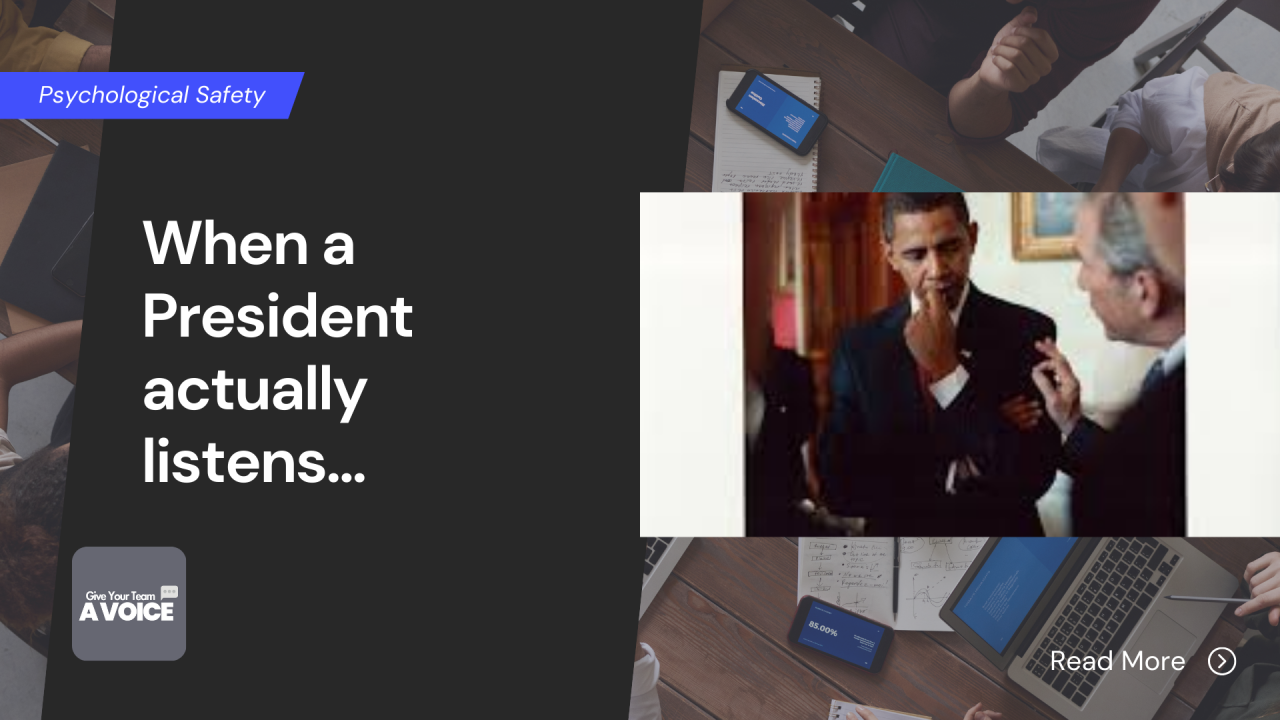When a President actually listens

The world has never been more volatile, uncertain, complex and ambiguous (VUCA). Business demands a fast-pace and increasing accountability, meaning a culture where colleagues feel safe sharing ideas and concerns is more crucial than ever for problem solving, innovation, growth, motivation and engagement. While you consider how best to ensure your colleagues’ voices are heard and valued, here’s how some renowned leaders do it. Which would you steal from with pride?
Empathetic Listening: Barack Obama
The 44th President of the US, was known for his empathetic listening skills. During town hall meetings and public addresses, he took the time to listen to people's concerns and respond thoughtfully. This approach made individuals feel heard and valued. By showing genuine interest in the voices of others, Obama created an environment where people felt comfortable sharing their thoughts and ideas, something absent from the 47th.
Making Candour Real: Ed Catmull
Ed Catmull, the Co-founder of Pixar, emphasised the importance of candour at work. He attributed the success of Pixar's films, including the ground breaking Toy Story in 1995 and a generation of box office hits down to a culture that thrives on forthrightness and creativity. His principle was to ensure criticism was not personal but constructive. He institutionalised this approach through the "Brain Trust," a group that provided honest feedback on all movies. Catmull also set the tone saying “all movies start out averagely”, encouraging colleagues to be open in discussions so they could improve them.
Finding Problems to Solve: Bill Gates
In his book Business at the Speed of Thought, Bill Gates encourages CEOs to actively seek out problems within their organisations so they can be resolved. This proactive approach to problem-solving must be executed in an environment where employees feel safe to voice concerns and suggest improvements. Awful management phrases like ‘don’t come to me with problems, come to me with solutions’ are unhelpful and should be banned – this is my view as they supress colleagues. By addressing problems head-on, Gates promotes a culture of transparency and trust, where speaking up is not only accepted but expected. In my experience, identifying problems can often be down to individuals, but resolving them is a team sport.
Farming for Dissent: Reed Hastings
At Netflix, their CEO, Reed Hastings, developed two simple principles. Appointing ‘informed captains’ to projects, whose role is to ‘farm for dissent’. This means actively seeking out differing opinions and encouraging team members to voice their concerns. By valuing dissent, Netflix ensures that all perspectives are considered, leading to better decision-making and innovation. It led them to delivering all 13 episodes of House of Cards to us in 2013, breaking the seal on binge watching, which we are so used to now. This approach creates a culture where employees feel safe to speak up, knowing that their input is heard, valued and respected.
Going last: Jeff Bezos
The founder of Amazon often speaks last in meetings. This strategy is designed to create an environment where team members feel comfortable sharing their ideas and opinions without being influenced by the leader's perspective. He also often seeks out the views of the most junior person in the room. Why? Because they are often the closest to the customer, closest to what is really happening in the business.
Role Modelling Vulnerability: Eileen Fisher
Eileen Fisher, the American fashion designer, exemplifies vulnerability and humble listening. Describing herself as a “don't knower," she invites participation and active listening to enable diverse opinions. By modelling vulnerability, she encourages her team to speak up without fear of judgement.
Which will you steal from with pride?
Creating an environment that encourages colleagues to share ideas and concerns is essential for any organisation aiming for success. Whether it’s Obama’s empathetic listening; Catmull’s candour; Gate’s problem surfacing; Hasting’s farming for dissent; Bezos’ going last or Fisher’s vulnerability - which will you steal from with pride?
